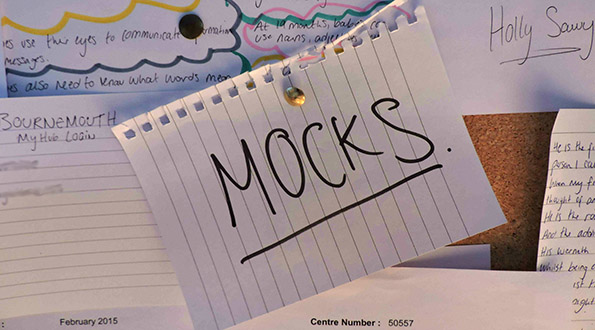
I always think that late January has something of a ‘between the wars’ feeling to it in school. As Year 11 students breathe a sigh of relief and head bleary-eyed back into lessons after their mock exams, Year 13 students are girding their loins for the onslaught of their own practice papers. And let there be no doubt, mock exams are a significant hurdle. At first glance, they may simply appear to be a measurement against the exam boards’ yard sticks, but, of necessity, they are crammed into a short period of time, and doomed to attempt the near impossible – to give a picture of overall attainment in courses that are not even completed in many cases.
For teachers, parents and guardians they represent a challenge too. At best, they provide a helpful pointer in terms of likely achievement, but they also often hint at how much more could be achieved if heels were picked up and whips were cracked, ringing alarm bells that can lead to disillusionment. We must help students to see mocks as opportunities for development and reflection that do not merit such draining emotional torments, while also ensuring they take them seriously.
And yet, year after year, we see final exam grades that significantly outstrip mock results. So surely they are doing their job? I would argue that this is indeed the case, and the very fact that they are able to replicate some of the high stakes to come is what leads to this success.
So, what is indispensable to effective learning and how do mocks help with this? Research points to active processes for recalling information as being the most effective. In essence, this is what tests do – force learners actively to reclaim specific knowledge from their memories, according to the requirements of a given paper.
This is why past paper practice, like the mocks, can be such a good way to revise. If you want to support a learner towards a specific aim, you practise within the context. It is of little help to a learner driver in a practical test to read and reread the Highway Code, but improving parallel parking by completing the manoeuvre multiple times in different parts of town will certainly make a difference.
In their research, Dunlosky et al. say that practice testing has ‘high utility’ and is ‘not time intensive in comparison with other techniques’. This comparison is with very widespread but unproductive methods for revision, such as rereading, highlighting and making notes. Study vlogger Ali Abdaal goes into more detail on this in his YouTube channel here: youtu.be/ukLnPbIffxE
So, gather all the past papers and individual practice questions you can. Complete them (in timed conditions, if possible) and seek feedback on all of them. Use www.thestudentroom.co.uk forums to see what other people thought of past papers and get to know what the board is looking for by reading examiners’ reports.
Don’t forget, the more active you are in extracting your memories, the more learning you are doing.
John Dunlosky, Katherine A. Rawson, Elizabeth J. Marsh, Mitchell J. Nathan, Daniel T. Willingham; Improving Students’ Learning With Effective Learning Techniques: Promising Directions From Cognitive and Educational Psychology. In Psychological Science in the Public Interest Journal, January 2013